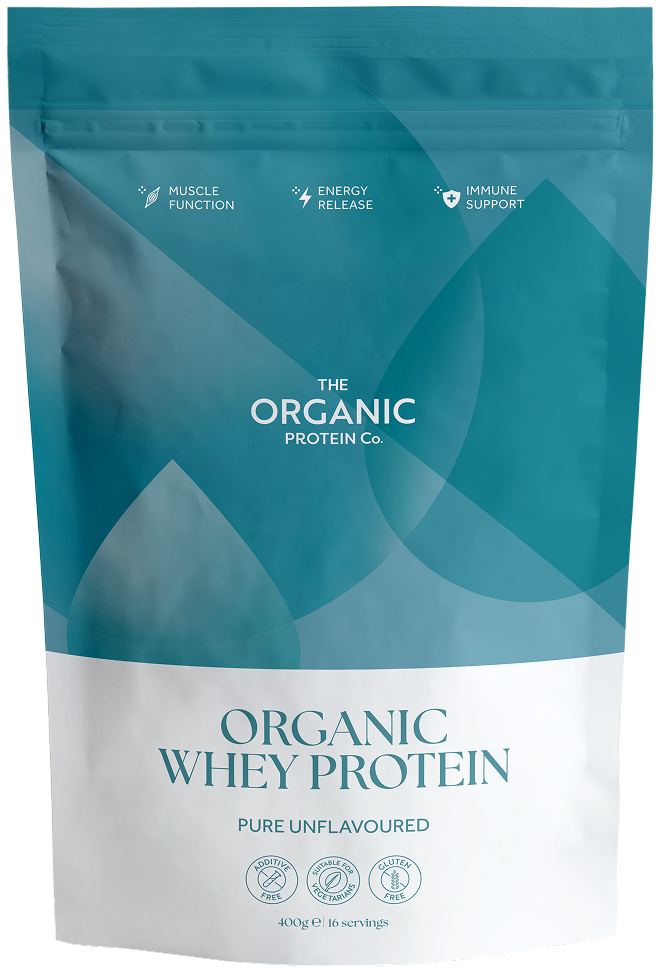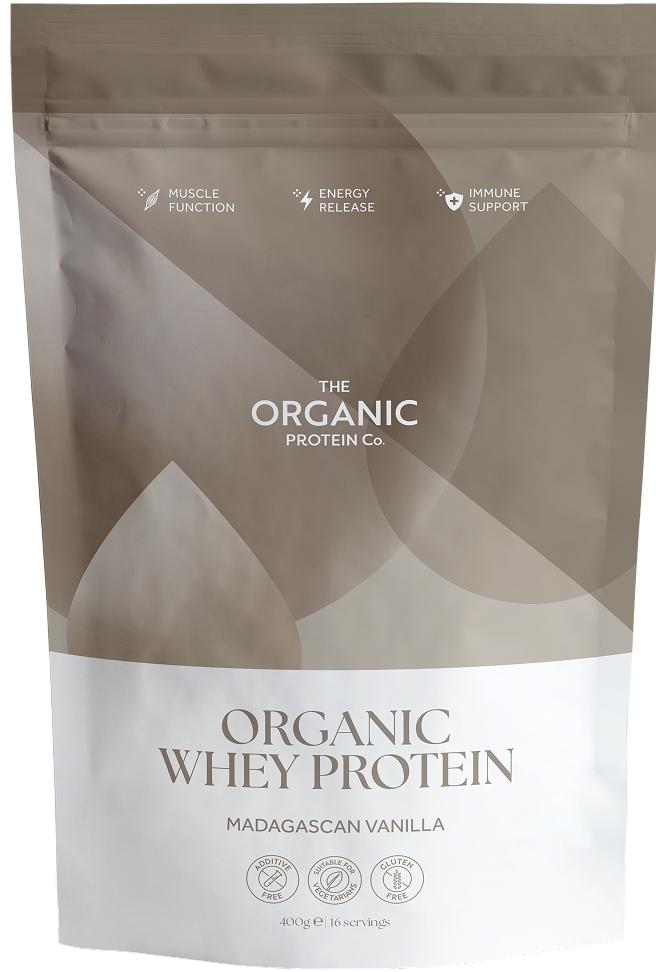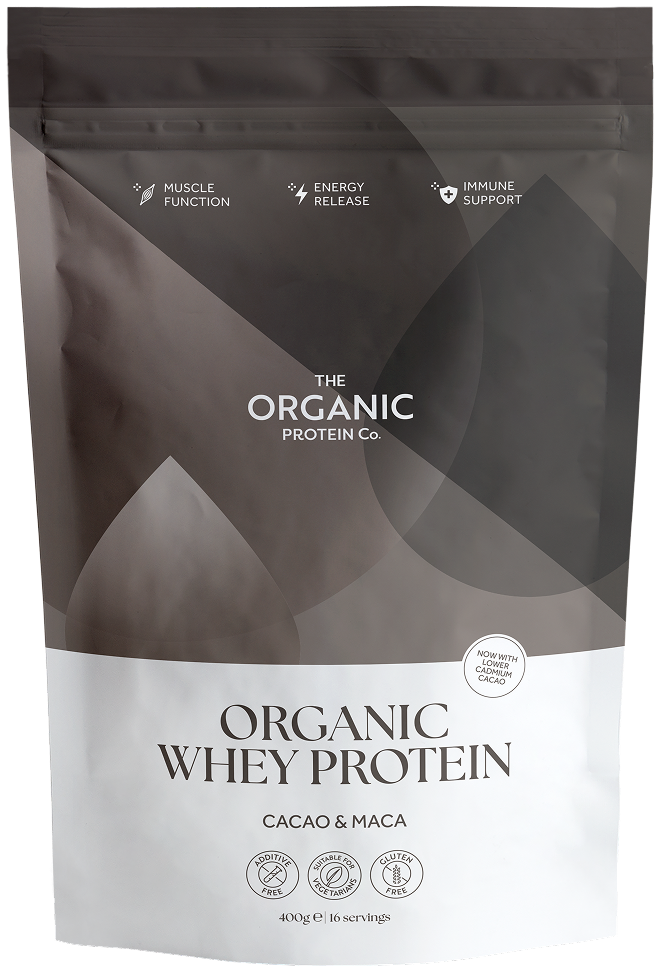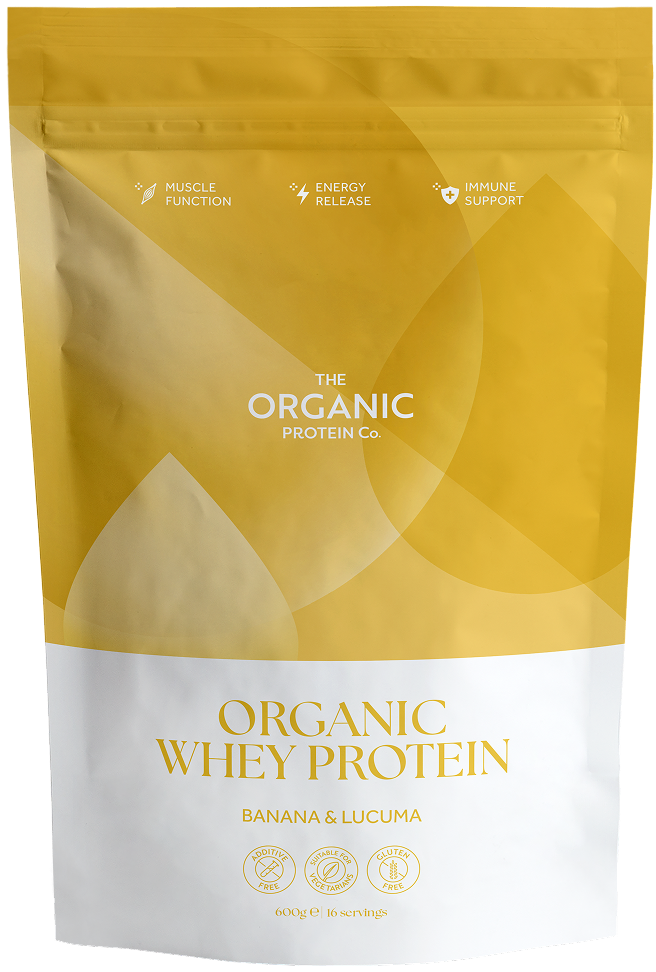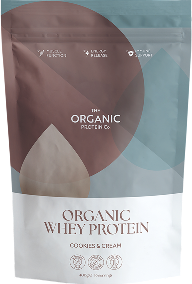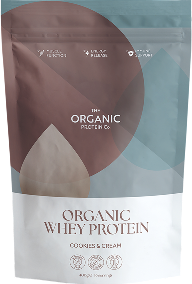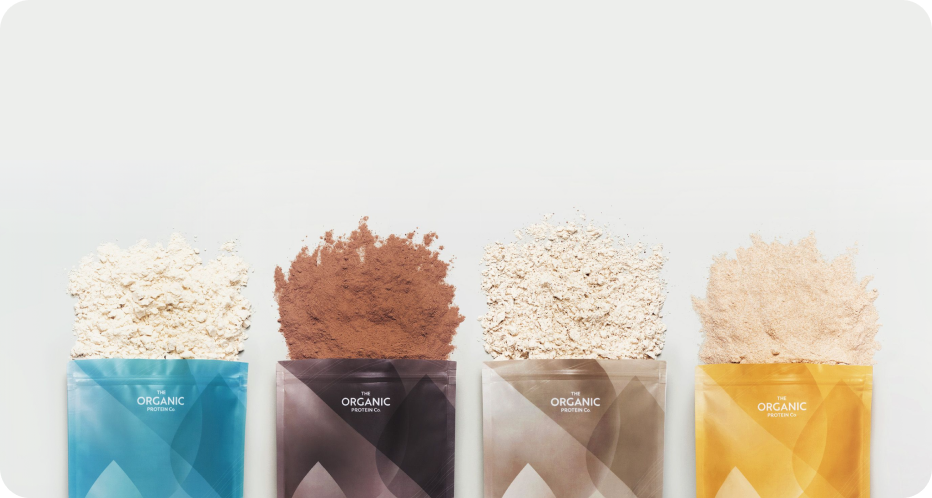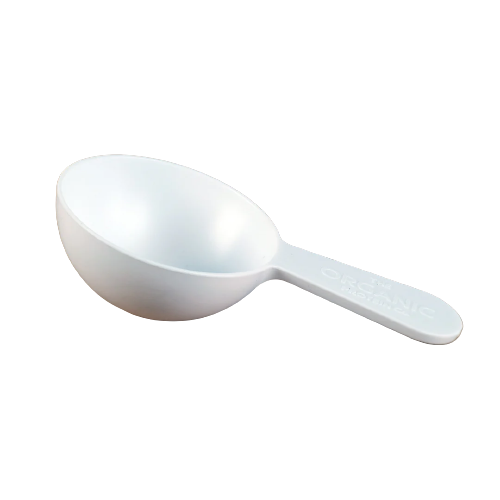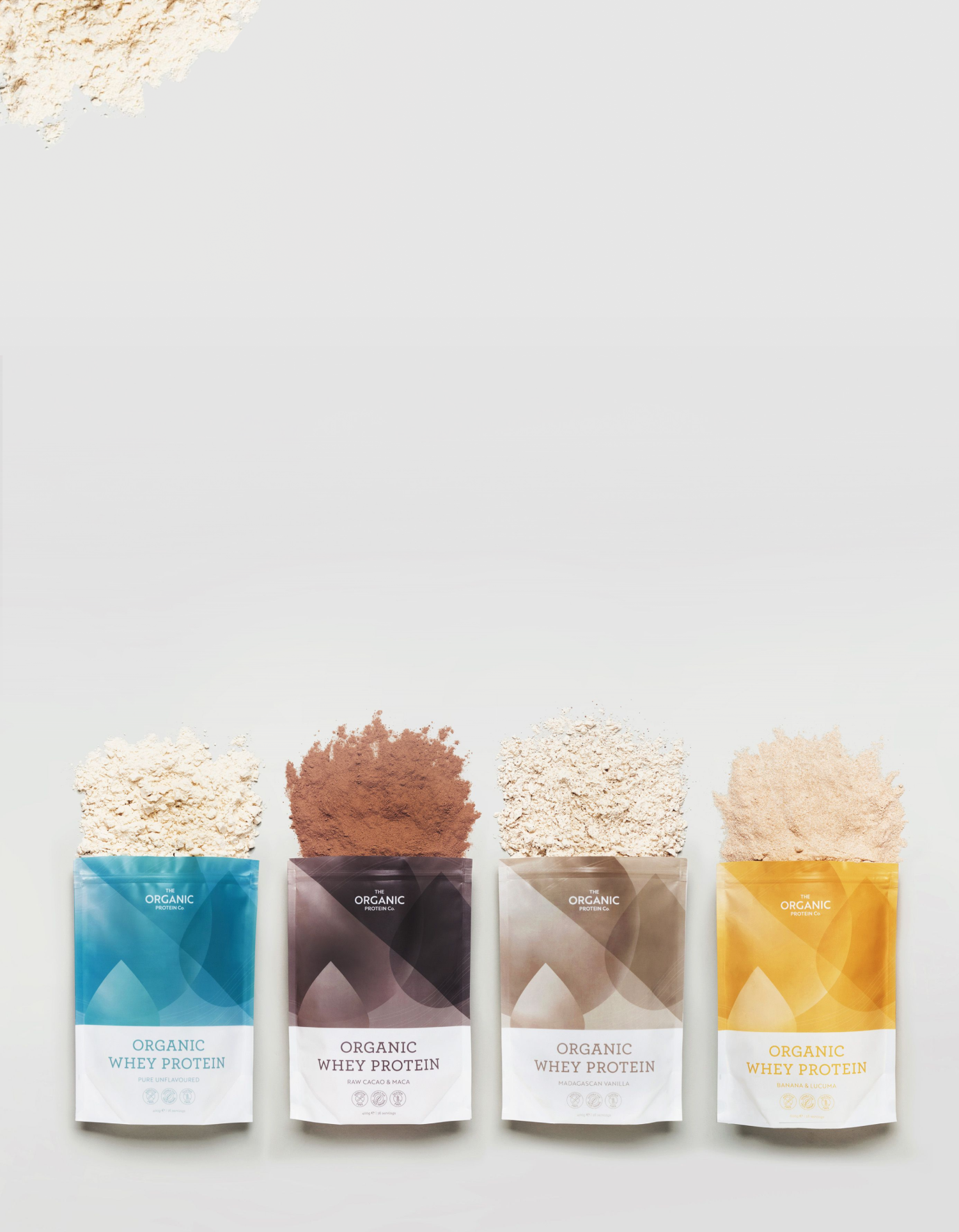You might have come across the terms cold-pressed whey, cold-filtered whey, or cold-processed whey protein and wondered what they actually mean–and whether it makes any real difference. The short answer: yes, it does.
Let’s walk through what this process involves and why it’s so important when it comes to quality, nutrition, and your overall experience of whey protein.
What Is Cold-Filtered (Cold-Pressed) Whey Protein?
All three terms – cold-filtered, cold-processed, and cold-pressed – are often used interchangeably. They refer to the same thing: whey protein that has been gently filtered at low temperatures, without the use of heat or harsh chemicals.
The term can be somewhat deceiving, as these methods don’t avoid heat entirely. Instead, cold-pressing refers to a process where the temperature and heating time are carefully controlled and limited, exposing the delicate protein structures to as little heat as possible to protect their integrity.
This cold filtration process helps to preserve the natural structure of the protein, maintaining its integrity, flavour, and nutritional profile. It also avoids denaturing the proteins, which can occur when whey is processed using high temperatures or acid treatments.

Why We Only Use Cold-Filtered Whey
We’ve chosen cold filtration for our whey protein for two main reasons: to protect the delicate nutrients in whey, and to avoid the harsh industrial methods used in standard protein processing.
In typical commercial production, whey protein is often heat-treated to speed things up. But heat can alter the structure of proteins, especially sensitive ones like cysteine and glutamine, potentially reducing their bioavailability and overall benefit.
By contrast, cold-filtering (sometimes referred to as cold-pressing) gently removes unwanted fats and carbohydrates at low temperatures, keeping the good stuff intact – without using high heat.
A Quick Word on Denatured vs Undenatured Whey
While denatured protein isn’t necessarily bad, it’s no longer in its natural form. This matters for people looking to get the full benefit from their whey–particularly for recovery, immune support, and digestion.
Cold-filtered whey protein remains undenatured, which means the protein chains stay closer to how nature intended. That’s one of the reasons why our protein tastes creamier and is gentler on digestion.
An Example of Denaturation in Your Kitchen
To understand denaturation, think about when you boil an egg. As you heat the egg in the water, the proteins in the egg whites become denatured, turning the originally transparent liquid solution into an opaque, solid mass. This signals irreversible denaturation of the proteins; their structure and function have changed.
Why Cold Processing Makes a Better-Tasting Protein Powder
Another big benefit of avoiding heat and chemicals? Flavour.
Because cold-filtering doesn’t rely on industrial solvents or high temperatures, the resulting protein has a naturally clean and mild flavour – no need to mask it with heavy flavourings or sweeteners. That’s why you’ll notice such a subtle, smooth taste in our Organic Whey Protein, even when it’s unflavoured.
Conventional Whey Protein Processing Methods
Traditional whey protein filtration and extraction often involve more intense heat exposure, in addition to chemical treatments which lower the final product’s quality. These conventional methods typically include one or more of the following steps:
High-temperature pasteurisation: Ultra high temperature (UHT) milk is ultra-pasteurised and heated to 135-150°C for a few seconds, increasing the chances of denaturing the delicate proteins and reducing bioactivity. (1), (2), (3) While this method offers efficiency, cost-savings and extended shelf life for brands, it can compromise the milk's nutritional integrity and the benefits of your whey even before it’s been filtered out.
Ion exchange filtration: This chemical process uses chemical agents such as hydrochloric acid and sodium hydroxide to extract and filter the whey, which can alter protein structure and strip away beneficial compounds such as lactoferrin and immunoglobulins. (4)
Heat-intensive evaporation: Conventional methods may use higher temperatures for longer periods to concentrate the whey, risking further protein denaturation.
Spray drying: Usually the last step in the process before whey protein is packaged and distributed, high and uncontrolled spray drying temperatures can lead to higher levels of denatured protein in the final product. (5)
This means that the three-dimensional structure of these proteins will be altered, decreasing their bioavailability – how well your body can absorb and utilise it – and thereby affecting the nutritional value of your protein powder. This same process may be caused by other factors such as acidic conditions and even physical manipulation. (2)
The Cold-Pressed Protein Difference
To protect the delicate protein compounds which are vital to whey’s unique muscle and immunity support, we use a range of methods which are more gentle and controlled to extract, filter and dry our whey:
Pasteurisation: Our process begins with careful pasteurisation at 70°C for just 15 seconds. This brief exposure to heat effectively eliminates harmful bacteria without compromising the milk's nutritional integrity – higher temperatures and longer exposure may begin to denature key bioactive compounds before the whey is even extracted. (6)
Gentle filtration: We use an advanced, purely mechanical technique where the whey undergoes a high-pressure ceramic filtration. This separates out the lactose, fat and minerals and extracts the protein-rich whey, ultimately reducing the lactose content by around 95%.
Evaporation:After filtration, we employ a very gentle heating process at 30°C to reduce the liquid content and achieve a thicker consistency. Heat exposure is minimised as much as possible to retain nutritional integrity and prevent denaturation.
Spray drying: We then use spray drying as a rapid dehydration process. During this process, the concentrated liquid whey is atomised and then passed through a chamber of hot air (at 200°C) for only a fraction of a second. This once again minimises heat exposure.
By using these cutting-edge, gentle techniques, we have been able to ensure that our whey protein powders remain at least 80% undenatured.
The impact of whey protein processing on denaturation
Before the whey in your pouch or tub was ready to add to shakes, bakes and other recipes, it had to undergo extraction and filtration processes to remove excess lactose and fats and dry it down into powdered form.
The methods used to do this are key to everything from the protein’s quality to its taste. Read on for insight into the difference between traditional and cold-pressed whey protein.

Conventional whey protein processing methods
Traditional whey protein filtration and extraction often involve more intense heat exposure, in addition to chemical treatments which lower the final product’s quality. These conventional methods typically include one or more of the following steps:
- High-temperature pasteurisation: Ultra high temperature (UHT) milk is ultra-pasteurised and heated to 135-150°C for a few seconds, increasing the chances of denaturing the delicate proteins and reducing bioactivity. (3) While this method offers efficiency, cost-savings and extended shelf life for brands, it can compromise the milk's nutritional integrity and the benefits of your whey even before it’s been filtered out.
- Ion exchange filtration: This chemical process uses chemical agents such as hydrochloric acid and sodium hydroxide to extract and filter the whey, which can alter protein structure and strip away beneficial compounds such as lactoferrin and immunoglobulins. (4)
- Heat-intensive evaporation: Conventional methods may use higher temperatures for longer periods to concentrate the whey, risking further protein denaturation.
- Spray drying: Usually the last step in the process before whey protein is packaged and distributed, high and uncontrolled spray drying temperatures can lead to higher levels of denatured protein in the final product. (5)
Protecting Whey’s Unique Bioactive Proteins
Protein denaturation is a natural process; in fact, it’s exactly what our bodies do with protein once we’ve eaten it. And, as we saw in the example of boiling an egg, it occurs regularly as we cook our food. In this sense, it’s not necessarily a bad thing.
However, when it comes to your whey protein powders, preventing denaturation as much as possible through low, controlled temperatures preserves its outstanding nutritional value.
This is because whey protein is not only full of essential and branched-chain amino acids but also a number of bioactive protein fractions like Alpha Lactalbumin, Beta Lactoglobulin, Immunoglobulin G and Lactoferrin (find out more about each of these impressive, immune system supporting compounds here).
The use of higher temperatures for longer periods increases the chance of denaturing these vital protein fractions, rendering them useless for your body as it can no longer utilise them. (7)

Additional Benefits Of Cold-Pressed Whey Protein
Cold filtering not only sustains the structural integrity of the whey proteins but also brings additional benefits that improve both the nutritional profile and your enjoyment of the finished product:
Preserving nutrients: Just as with fruits and vegetables, the vitamins and minerals in whey protein are preserved more effectively without excessive heat, potentially making it more nutritionally valuable than those processed at higher temperatures.
Mixability: Although mixability might initially seem less than perfect compared to denatured whey protein combined with emulsifiers (such as soy or sunflower lecithin), cold-pressed whey protein eventually dissolves more fully once properly mixed, avoiding any unpleasant bittiness.
Fresher taste: Avoiding high temperatures also means that cold-processed whey protein often has a fresher, cleaner taste, free from the bitterness and off “cooked” flavours produced by high-temperature processing.

What to Look For in a Cold-Processed Protein Powder
If you’re looking for a high-quality whey protein powder, here are a few things to keep an eye out for:
Cold-filtered or cold-processed, not heat-treated
Organic and grass-fed milk sources
Additive-free – no gums, thickeners or artificial flavours
Low-temperature processing (<40°C if specified)
Transparency around sourcing and methods
Summary – Why Cold Filtering Matters
Feature |
Standard Whey |
Cold-Filtered Whey |
Heat-treated? |
Often |
No |
Denatured protein? |
Likely |
No |
Preserves amino acids? |
Partially |
Yes |
Solvents/chemicals used? |
Sometimes |
No |
Taste |
Often masked |
Naturally smooth |

FAQs
What is the difference between cold-pressed, cold-filtered, and cold-processed whey protein?
These terms are used interchangeably. All refer to whey protein that has been filtered at low temperatures without heat or harsh chemicals
Why does cold filtration matter for whey protein?
It helps preserve the natural protein structure and amino acid profile, which may improve digestibility and nutritional quality.
Is cold-processed whey better for you?
It may be more beneficial for those seeking undenatured proteins, better taste, and minimal processing.

